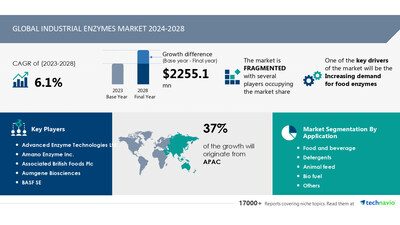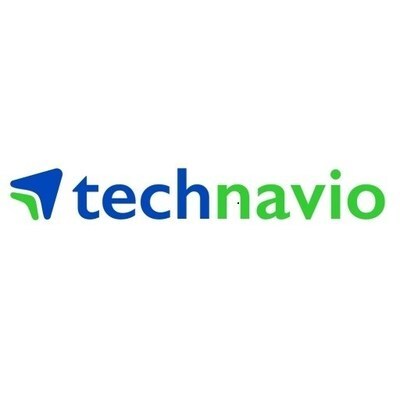Industrial Enzymes Market to Grow by USD 2.25 Billion from 2024-2028, AI Driving Market Transformation and Rising Demand for Food Enzymes Boosting Revenue - Technavio
NEW YORK, Oct. 14, 2024 /PRNewswire/ -- Report with the AI impact on market trends- The global industrial enzymes market size is estimated to grow by USD 2.25 billion from 2024-2028, according to Technavio. The market is estimated to grow at a CAGR of almost 6.1% during the forecast period. Increasing demand for food enzymes is driving market growth, with a trend towards recent advances in enzyme technology. However, complex production process poses a challenge. Key market players include Advanced Enzyme Technologies Ltd., Amano Enzyme Inc., Associated British Foods Plc, Aumgene Biosciences, BASF SE, Chr Hansen Holding AS, Codexis Inc, DuPont de Nemours Inc., Enzymatic Deinking Technologies LLC, F. Hoffmann La Roche Ltd., Jiangsu Boli Bioproducts Co. Ltd., Kerry Group Plc, Koninklijke DSM NV, Merck KGaA, Nature BioScience Pvt. Ltd., Neogen Corp., Novozymes AS, Novus International Inc., The Soufflet Group, and Thermo Fisher Scientific Inc..
AI-Powered Market Evolution Insights. Our comprehensive market report ready with the latest trends, growth opportunities, and strategic analysis- View your snapshot now
Forecast period |
2024-2028 |
Base Year |
2023 |
Historic Data |
2018 - 2022 |
Segment Covered |
Application (Food and beverage, Detergents, Animal feed, Bio fuel, and Others), Source (Microorganism, Animals, and Plants), and Geography (North America, APAC, Europe, South America, and Middle East and Africa) |
Region Covered |
North America, APAC, Europe, South America, and Middle East and Africa |
Key companies profiled |
Advanced Enzyme Technologies Ltd., Amano Enzyme Inc., Associated British Foods Plc, Aumgene Biosciences, BASF SE, Chr Hansen Holding AS, Codexis Inc, DuPont de Nemours Inc., Enzymatic Deinking Technologies LLC, F. Hoffmann La Roche Ltd., Jiangsu Boli Bioproducts Co. Ltd., Kerry Group Plc, Koninklijke DSM NV, Merck KGaA, Nature BioScience Pvt. Ltd., Neogen Corp., Novozymes AS, Novus International Inc., The Soufflet Group, and Thermo Fisher Scientific Inc. |
The industrial enzymes market has witnessed significant advancements due to the progress in genetics and process technology. Genetic engineering enables the production of improved and cost-effective enzymes by transferring genes from unsuitable organisms to safe hosts using protein-engineering tools. This results in enzymes with enhanced stability, specificity, and productivity. For instance, Chymosin, an essential enzyme in cheese production, is now produced using microorganisms that are easy to cultivate on inexpensive raw materials. Xylanase, a popular enzyme in the paper and pulp industry, has been produced on a large scale through genetic engineering. Recent breakthroughs in genomics have addressed challenges such as limited availability, substrate scope, and operational stability of xylanase. Genes encoding xylanase have been cloned into various hosts to overproduce and modify the enzyme for commercial applications. Laccase, another successful application in the food processing industry, can be overexpressed in suitable host organisms to achieve high titers. Genetic engineering has played a crucial role in the industrial production of various enzymes, including proteinase, cellulase, lipase, ?-amylase, and glucoamylase. These advancements are expected to drive the global industrial enzymes market during the forecast period.
The Industrial Enzymes Market is experiencing significant growth, particularly in sectors like Food & Beverage, Baker Products, and Fruit Juices. Proteases, Lipases, Carbohydrases, Polymerases, Nucleases from microorganisms and plant-based sources are in high demand. These enzymes play crucial roles in various applications such as Animal Feed, Dairy Products, and Biotechnology. Environmental issues and Genetic Engineering are driving the shift towards enzymes in place of harsh chemicals. Fermentation Processes are essential for producing high-quality enzymes. Product quality and shelf life are key concerns, leading to increased usage in Brewing, Baking processes, and Starch, Sugar products, Flour, Dough, Biscuits, Crackers, and Bread quality. Functional foods, Nutraceutical sector, Biofuel, Textiles, Health and lifestyle industries also utilize enzymes for their specific requirements. Protease, Lipase, Polymerase, and Nuclease are widely used in Food processing, Cheese processing, Vegetable processing, and Grain processing. Detergent formulations benefit from Bacterial and Fungal enzymes. Enzymes contribute to improved product quality and efficiency across various industries.
Insights on how AI is driving innovation, efficiency, and market growth- Request Sample!
• The industrial production of enzymes involves a intricate process that combines microbiology, genetics, and biochemistry. Sources of enzymes include animals, plants, microorganisms, and fungi. Microorganisms are the preferred choice due to their ease of cultivation and ability to produce enzymes in large quantities in a short timeframe. The selection and improvement of strains is crucial for optimal enzyme production. Inoculum preparation involves obtaining organisms suitable for industrial processes, which are then multiplied to produce large quantities for use. The culture medium must be formulated to support microbial growth and enzyme production, with readily available and cost-effective ingredients. Fermentation, carried out through submerged or solid-state methods, requires specific conditions for optimal growth and enzyme production. Recovery and purification of enzymes involve various methods depending on the nature of the enzyme and desired purity, with steps including removal of cell debris, nucleic acid, and contaminants, and concentration and drying techniques. This complex production process poses challenges for the industrial enzymes market, potentially hindering growth during the forecast period.
• The Industrial Enzymes Market faces several challenges in various industries. In Genetic Engineering, ethical concerns and regulatory approvals hinder growth. Fermentation processes require optimization for cost-effectiveness and consistency. Product quality and shelf life are crucial factors in Food and Beverage applications, especially in Brewing, Baking, Starch, Sugar products, Flour, Dough, Biscuits, Crackers, and Bread quality. Functional foods, Nutraceutical sector, Biofuel, Textiles, Health and lifestyle industries demand enzymes with high specificity and efficiency. Challenges include ensuring digestibility, addressing health concerns, and meeting the demands of Protease, Lipase, Polymerase, Nuclease, and other enzyme applications in Food processing, Cheese processing, Vegetable processing, and Grain processing. Detergent formulations benefit from Bacterial enzymes, Fungal enzymes, and Yeast enzymes. Market players must address these challenges to maintain competitiveness. Bromelain, a digestive enzyme, requires focus on its production and application in various industries.
Insights into how AI is reshaping industries and driving growth- Download a Sample Report
This industrial enzymes market report extensively covers market segmentation by
- Application
- 1.1 Food and beverage
- 1.2 Detergents
- 1.3 Animal feed
- 1.4 Bio fuel
- 1.5 Others
- Source
- 2.1 Microorganism
- 2.2 Animals
- 2.3 Plants
- Geography
- 3.1 North America
- 3.2 APAC
- 3.3 Europe
- 3.4 South America
- 3.5 Middle East and Africa
1.1 Food and beverage- The industrial enzymes market is experiencing steady growth due to increasing demand from various industries such as food and beverage, pharmaceuticals, and textiles. These enzymes enhance production processes, improve product quality, and reduce costs. Key players in the market include Novozymes, DuPont, and Danisco. Market growth is driven by factors such as regulatory support, technological advancements, and rising consumer awareness for health and sustainability.
Download complimentary Sample Report to gain insights into AI's impact on market dynamics, emerging trends, and future opportunities- including forecast (2024-2028) and historic data (2018 - 2022)
Industrial enzymes are biocatalysts used in various industries, including Food & Beverage, to enhance product quality and extend shelf life. In the Food & Beverage sector, enzymes find extensive applications in Baker Products, Fruit Juices, and Dairy Products. Proteases, Lipases, Carbohydrases, Polymerases, Nucleases, and Microorganisms are some of the commonly used enzyme types. Enzymes derived from plants and animals are gaining popularity due to environmental concerns and ethical considerations. Animal Feed and Biotechnology industries also utilize enzymes to improve efficiency and product quality. Environmental issues and genetic engineering have significantly influenced the production and application of industrial enzymes. Fermentation processes are widely used for enzyme production, ensuring high product purity and consistency. Enzymes play a crucial role in various processes such as Brewing, Baking, and Starch hydrolysis. They are used in Sugar products, Flour, Dough, Biscuits, Crackers, and other food applications to improve texture, flavor, and nutritional value. Protein content is another essential parameter influenced by enzymes, particularly in Dairy Products and Animal Feed. Enzymes help to improve the overall efficiency and sustainability of industrial processes.
Industrial enzymes are biocatalysts used in various industries for different applications. They play a crucial role in the production of Food & Beverage products, including baker's products, fruit juices, and dairy items. Enzymes such as Proteases, Lipases, Carbohydrases, Polymerases, Nucleases, and Microorganisms are commonly used in food processing. These enzymes enhance product quality, improve shelf life, and facilitate various processes like brewing, baking, and starch hydrolysis. The enzymes find extensive applications in the production of sugar products, flour, dough, and baked goods like biscuits, crackers, and bread. They also contribute to the nutraceutical sector and functional foods by improving digestibility and addressing health concerns. Industrial enzymes are also used in the textile industry for various applications, including detergent formulations. Biotechnology plays a significant role in the production of industrial enzymes, with advancements in genetic engineering and fermentation processes leading to the development of new and improved enzymes. Environmental issues and sustainability concerns are driving the demand for plant-based enzymes and microbial enzymes. Enzymes like Bromelain are used for their health benefits and improved protein content in dairy and meat processing. Industrial enzymes also find applications in the production of biofuels and in the health and lifestyle sector.
1 Executive Summary
2 Market Landscape
3 Market Sizing
4 Historic Market Size
5 Five Forces Analysis
6 Market Segmentation
- Application
- Food And Beverage
- Detergents
- Animal Feed
- Bio Fuel
- Others
- Source
- Microorganism
- Animals
- Plants
- Geography
- North America
- APAC
- Europe
- South America
- Middle East And Africa
7 Customer Landscape
8 Geographic Landscape
9 Drivers, Challenges, and Trends
10 Company Landscape
11 Company Analysis
12 Appendix
Technavio is a leading global technology research and advisory company. Their research and analysis focuses on emerging market trends and provides actionable insights to help businesses identify market opportunities and develop effective strategies to optimize their market positions.
With over 500 specialized analysts, Technavio's report library consists of more than 17,000 reports and counting, covering 800 technologies, spanning across 50 countries. Their client base consists of enterprises of all sizes, including more than 100 Fortune 500 companies. This growing client base relies on Technavio's comprehensive coverage, extensive research, and actionable market insights to identify opportunities in existing and potential markets and assess their competitive positions within changing market scenarios.
Technavio Research
Jesse Maida
Media & Marketing Executive
US: +1 844 364 1100
UK: +44 203 893 3200
Email: media@technavio.com
Website: www.technavio.com/
![]() View original content to download multimedia:https://www.prnewswire.com/news-releases/industrial-enzymes-market-to-grow-by-usd-2-25-billion-from-2024-2028--ai-driving-market-transformation-and-rising-demand-for-food-enzymes-boosting-revenue--technavio-302274747.html
View original content to download multimedia:https://www.prnewswire.com/news-releases/industrial-enzymes-market-to-grow-by-usd-2-25-billion-from-2024-2028--ai-driving-market-transformation-and-rising-demand-for-food-enzymes-boosting-revenue--technavio-302274747.html
SOURCE Technavio

 Index Options
Index Options CME Group
CME Group Nasdaq
Nasdaq Cboe
Cboe TradingView
TradingView Wall Street Journal
Wall Street Journal
